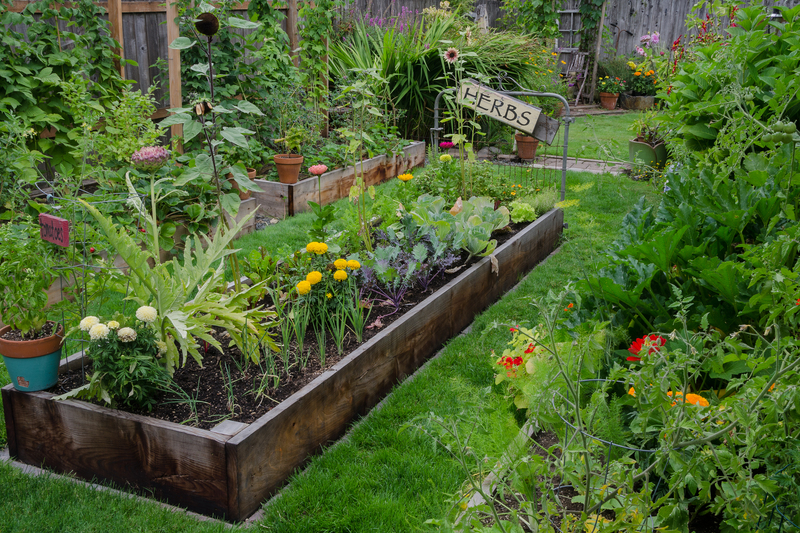Turning Leftovers into Life: The Art of Composting Soil
Posted on 27/05/2025
Turning Leftovers into Life: The Art of Composting Soil
Have you ever wondered what happens to your kitchen scraps and yard waste after you toss them away? More than just garbage, these organic discards can be transformed into nutrient-rich compost, supporting plant life and healthy soil ecosystems. This process, known as composting soil or soil composting, is a sustainable practice that redefines waste as a resource. In this comprehensive article, we explore the ins and outs of home composting, the science behind soil creation, and the tangible benefits for you, your garden, and the planet.
What is Composting Soil?
Composting soil refers to the process of converting organic matter--such as food leftovers, yard clippings, and paper--into humus, the dark, crumbly, sweet-smelling material that enriches soil health. Through composting, various microorganisms break down the organic substance, producing a natural fertilizer that can boost biodiversity, improve water retention, and reduce landfill waste.
How Composting Works: The Science Behind the Magic
The compost pile is a busy ecosystem. Bacteria, fungi, worms, and insects work synergistically to decomposing materials. The main elements behind efficient composting soil creation are:
- Carbon (Browns): Dry leaves, twigs, cardboard, and paper.
- Nitrogen (Greens): Fruit and vegetable scraps, coffee grounds, grass clippings.
- Moisture: Essential for microbial activity.
- Oxygen: Necessary for aerobic decomposition.
Understanding the carbon-to-nitrogen (C:N) ratio is key for healthy compost. Aim for a ratio of about 30:1 for optimal microbial activity.

Benefits of Turning Leftovers into Compost Soil
1. Reduce Household Waste
Did you know? Up to 30% of what we throw away can be composted. By converting food scraps into compost, you significantly reduce landfill contributions and methane emissions, a potent greenhouse gas.
2. Enrich Your Garden Naturally
Compost is an organic fertilizer that adds essential nutrients to garden soil. This not only improves soil structure, but also encourages robust root development and improves water retention.
3. Support Biodiversity and Soil Health
Good composting soil is alive with microbes and beneficial insects. These soil organisms boost biodiversity, support disease resistance, and aid in breaking down toxins naturally.
4. Save Money
Using homemade compost reduces the need to buy chemical fertilizers or soil amendments. Gardening becomes more sustainable and budget-friendly!
Setting Up Your Compost System: A Step-By-Step Guide
Ready to turn leftovers into life? Here's how you start the journey towards rich, living compost soil:
1. Choose Your Composting Method
- Backyard Composting: Ideal if you have outdoor space. Use a simple pile, bin, or tumbler.
- Vermicomposting: Uses worms to accelerate decomposition, great for apartments and small spaces.
- Bokashi Composting: Ferments kitchen waste with special inoculated bran, producing compostable material quickly.
2. Select the Right Location
- Choose a semi-shaded, well-drained spot.
- Keep your compost bin or pile accessible for regular use.
3. Gather Your Materials
- Greens: Vegetable peels, coffee grounds, green yard trimmings, eggshells, tea bags (without plastics).
- Browns: Dry leaves, shredded paper, cardboard, straw, wood chips.
- Avoid: Meat, dairy, oily foods, synthetic materials, diseased plants.
Tip: Shred or chop large items for faster decomposition!
4. Start Layering
- Begin with a layer of browns on the bottom to promote drainage and airflow.
- Add alternating layers of greens and browns.
- Maintain a moist, but not soggy, pile--like a wrung-out sponge.
5. Maintain Your Compost Pile
- Turn or aerate your pile every 1-2 weeks to provide oxygen and balance temperature.
- Add water if the pile dries out and extra browns if smells like ammonia.
- Watch for a temperature increase during the active composting phase--a sign of healthy decomposition.
Accelerating the Soil Composting Process
Patience is essential, but you can speed up your composting through:
- Chopping food scraps into smaller pieces for quicker breakdown.
- Adding compost activators like finished compost, garden soil, or commercial starters.
- Maintaining a balanced C:N ratio and correct moisture levels.
- Most piles will produce finished compost in 3-6 months with proper care.
Common Composting Mistakes & How to Avoid Them
Composting is forgiving, but here's how to steer clear of pitfalls:
- Pile smells bad? Too much green material or excess moisture. Fix: Add more browns and aerate.
- Too dry? Pile won't decompose. Fix: Add water and mix.
- Pests or rodents? Avoid dairy, meat, and oily foods; always cover new additions with browns.
- Pile not breaking down? Increase greens, improve aeration, chop materials finer.
Finished Compost: When Is It Ready?
Finished compost, sometimes referred to as "black gold," should have:
- A dark, crumbly appearance
- Earthy aroma (no foul smells)
- No identifiable food or yard waste
Depending on your method and climate, your compost may mature between two months and a year. Don't hurry--fully finished compost is the best for soil health!
How to Use Compost in Your Garden
Once your compost is ready, it can be used to invigorate any garden, lawn, or landscape:
Top Ways to Apply Compost Soil:
- Soil amendment: Mix into garden beds to enhance nutrient content and structure.
- Top dressing: Spread a layer around trees, shrubs, or potted plants for slow nutrient release.
- Lawn booster: Sprinkle fine compost over turf to strengthen grass health.
- Compost tea: Steep compost in water for a liquid fertilizer rich in beneficial microbes.
Pro tip: Avoid planting directly in uncomposted (fresh) organic matter, as it can deplete soil nitrogen.
Composting Soil in Urban Environments
Living in a city should not stop you from enjoying the rewards of urban composting soil:
- Community Gardens: Many offer communal compost bins for residents.
- Countertop Bins: Collect food scraps for weekly drop-off or pickup.
- Worm Bins: Compact enough for apartments; worms safely process food scraps into rich worm castings.
- Municipal Collection: Some cities offer green bin programs for curbside composting.
Start small--even a balcony or windowsill can host an efficient composting container!
Frequently Asked Questions About Composting
Is composting safe?
Absolutely! Composting is a natural process. Properly managed piles (correct balance of greens and browns, no meat or dairy) rarely create safety issues.
What can I not put in compost?
- Meat and bones
- Dairy products
- Fats and oils
- Pet waste
- Diseased plants
- Weeds gone to seed
These items can attract pests, introduce pathogens, or complicate decomposition.
How often should I turn my compost?
For a backyard compost pile, once every one or two weeks is ideal.
Does composting attract bugs or critters?
Some bugs (like worms, sowbugs, and beetles) are essential to decomposition! To deter unwanted pests, avoid meat, dairy, and oily foods, and always cover food scraps with carbon-rich material.
Can compost go bad?
Compost can turn anaerobic and smell if too wet or lacking oxygen. Fix by mixing in dry browns and turning the pile.
Composting Soil: The Environmental Impact
When you compost kitchen leftovers and yard waste, you not only save money and improve your soil--you fight climate change:
- Reduces Landfill Waste: Less organic matter sent to landfills, resulting in lower methane emissions.
- Recycles Nutrients: Returns valuable elements to the earth, improving food security and ecosystem health.
- Promotes Sustainable Gardening: Decreases dependence on synthetic fertilizers and pesticides.

Composting Soil for a Healthier Future
Turning leftovers into life isn't just about gardening--it's about stewardship, creativity, and a commitment to a better planet. Whether you're tending a backyard oasis or an indoor herb planter, soil composting is an art anyone can master. Each orange peel or fallen leaf is a building block for future harvests, vibrant flowers, and thriving communities. So grab your compost bin, start small, and watch as your food waste transforms into living soil--one handful at a time.
Ready to Start Composting?
- Gather your kitchen and yard waste.
- Choose a composting method that suits your lifestyle.
- Follow the simple steps above to begin crafting your soil compost.
- Spread the word--every compost pile helps regenerate the planet!
Remember: Composting soil is a journey, not a race. Enjoy the process, connect with nature, and celebrate the cycle of life your leftovers help nurture.
Latest Posts
Must-Have Gardening Gear for Nature Lovers
Gardens: Small Spaces Making a Big Climate Difference
Tips for Designing an Interactive Garden for Kids
Ultimate Strategies for Preventing Severe Weather Damage in Gardens
From Concept to Comfort: Building Exceptional Garden Seating

